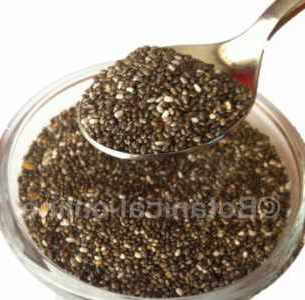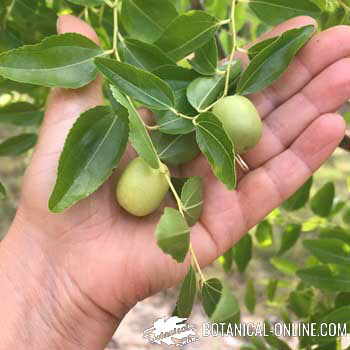Contents
- 1 What brand of omega 3 is recommended?
- 1.1 OMEGA 3 RECOMMENDED SUPPLEMENTS
- 1.2 What is and what are omega 3 supplements?
- 1.3 Is it better to take omega 3 from foods or supplements?
- 1.4 Avoid postponing adequate treatment
- 1.5 Comparison of supplements and foods with omega 3
- 1.6 Is it necessary to take omega 3 supplements?
- 1.7 Linseed oil supplements, without EPA and DHA
- 1.8 Amount of omega 3 that supplements should have
- 1.9 Quality of the supplements
- 1.10 What about flaxseed oil as an omega 3 supplement?
- 1.11 Which is better, fish oil or flaxseed oil?
- 1.12 Are omega 6 supplements recommended?
- 1.13 Omega 3, 6 and 9 supplements, are they recommended?
- 1.14 Is Krill oil recommended?
- 1.15 Where to buy an omega 3 supplement
- 1.16 Recommended brands of omega 3
- 1.17 Hazards, toxicity and contraindications of omega 3
What brand of omega 3 is recommended?
OMEGA 3 RECOMMENDED SUPPLEMENTS
What is and what are omega 3 supplements?
Omega 3 is a type of fat that is essential for the body. It is called essential because it can not be synthesized in the body, which means that it must be provided through the diet. From this component, the body can manufacture its own anti-inflammatories.
Omega 3 supplements are mainly recommended for:
- Improve circulation and heart healt
- Decrease inflammation and pain
However, there are many doubts both in the indications of this type of supplements, and when buying them: Is it better to take them in the form of food or supplements? How much omega 3 should the supplements have? What brand is recommended? All these doubts are solved below.
Is it better to take omega 3 from foods or supplements?
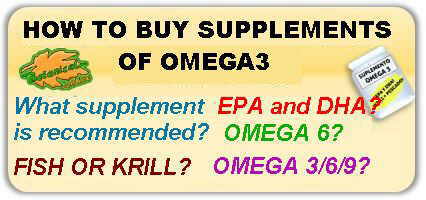
Some of the doubts that awake the supplements of omega 3, EPA, DHA, fish oils or flax … What is recommended?
Before recommending any nutritional supplement, food should be assessed, for two main reasons:
- It is always better to provide a nutrient within a food, because the matrix of that food provides other macro and micronutrients that improve the assimilation of that component. For example, walnuts contain a lot of omega 3, accompanied by phytochemicals and vitamin E, which are antioxidants, protect omega 3 from its deterioration and prevent oxidative stress.In addition, other beneficial components are found in natural foods: following the example of walnuts, they provide fiber and phytosterols that help eliminate cholesterol and contribute to the improvement of cardiovascular health. In contrast, an omega 3 supplement provides only one nutrient, outside its food matrix, so its effect is less physiological.
- To assess a supplement, a reference food is necessary: We can not assess whether an omega X supplement has a large or small amount of that nutrient, if we do not have a reference food with which to compare it.
Avoid postponing adequate treatment
In addition to the quality of the supplement, it is always necessary to have the opinion or criteria of a specialist. Sometimes the use of nutritional supplements or curative diets is used as a first option, without consulting a health professional, which may delay a diagnosis and proper treatment. When faced with a health problem, the first thing that is recommended is to consult an expert.
Comparison of supplements and foods with omega 3
Omega 3 fats are found in many natural foods and in vegetable oils. Normally, these fats are accompanied by other types of fats, such as saturated fats and monounsaturated fats. What varies from foods with a lot of omega 3 is that they have more omega 3 than other types of fat, or that they contain it in greater proportion, compared to other foods.
You could say that star foods, the richest in omega 3, are fatty fish (oily fish). Therefore, this reference food will be taken to compare and evaluate the omega 3 supplements.
Next, a portion of fresh salmon (not smoked) is compared with a supplement of the highest in omega 3 EPA and DHA that exist in the market (* Note: EPA and DHA are two types of omega 3):
- Salmon contains almost 5 times more omega 3 “DHA” than 1 capsule of omega 3 very rich in EPA and DHA
- Salmon contains almost 3 times more omega 3 “EPA” than 1 capsule of omega 3 very rich in EPA and DHA
- This leads to the conclusion that you get more omega 3 by eating fatty fish twice a week, than by taking omega 3 supplements every day.
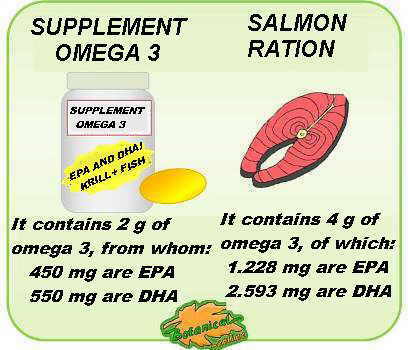
Comparison of the amount of omega 3 in an omega 3 supplement (amount per capsule) with the amount of omega 3 provided by a serving of fresh salmon (180 g approx.)
It should be noted that one of the most omega-3 supplements that are currently on the market has been compared. Normally, most supplements have less omega 3 than calculated on these lines.
Is it necessary to take omega 3 supplements?
As you have seen, you get much more omega 3 by eating blue fish twice a week, than by taking omega 3 supplements every day. In addition, it should be added that the body itself is capable of producing omega 3 of the EPA and DHA type from the omega 3 provided by plant foods, such as walnuts, flax or chia.
Therefore, it could be said that omega 3 supplements are not necessary to obtain this nutrient. The requirements of omega 3 can be assumed through food, being blue fish a very rich option in omega 3 and in its derivatives EPA and DHA.
That said, people interested in buying omega 3 supplements, as an extra omega 3 supplement, in addition to the ingested through the diet, are recommended to continue reading this article, which will talk about recommended omega 3 and types of supplements.
Linseed oil supplements, without EPA and DHA
Supplements that only contain omega 3 of vegetable origin (called linolenic acid or “ALA”) are not recommended, because it is much better, more nutritious, easier and more economical, to assume these contributions through some walnuts, or seeds of ground chia, flax or hemp.
It is not correct to use flaxseed oil supplements (vegetable omega 3 supplement) as a vegetarian alternative to fish oils. The vegetarian substitute of EPA and DHA is the marine DHA supplement that is extracted from algae.
See another comparison with an omega 3 supplement from flaxseed oil (without EPA and DHA, that is, without fish oils) and vegetable foods rich in omega 3:
- Eating 7 walnuts or adding 2 teaspoons of ground flax provides almost twice as much omega 3 as a pearl of flaxseed oil. In addition, foods have the benefits of fiber, minerals, …
- It is more economical and nutritious to consume seeds than to take supplements
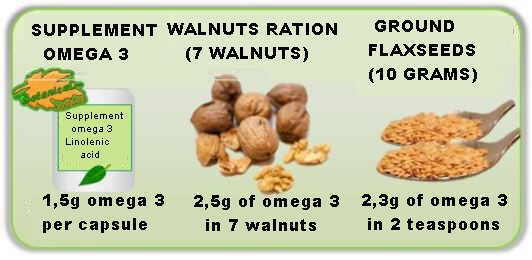
Comparison of the amount of omega 3 in a flaxseed oil supplement and the amount of omega 3 naturally occurring in foods rich in this component
Amount of omega 3 that supplements should have
There is no recommended daily dose of omega 3, since so many components interact in food, that it is impossible to determine what optimum amount of omega 3 a person needs. What is known is that the presence of this component in the diet improves health.
In view of the previous example, it could be recommended that, at least, an omega 3 supplement supposes a contribution equivalent or similar to that provided by a food rich in this component, such as salmon or sardines.
Therefore, fish oil supplements containing the highest possible amount of EPA and DHA, at least 450 mg of EPA and 550 mg of DHA per capsule or bead are recommended.
Quality of the supplements
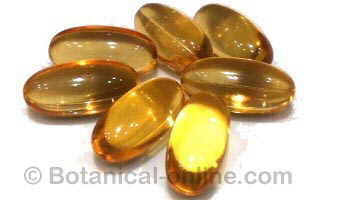
Omega 3 supplements are in the form of oil beads
Regarding the quality of the supplements, once we found a fish oil supplement (EPA and DHA) that has an adequate amount of principles, the aspects summarized in the following points should be considered:
- All supplements must specify on their label the amount of EPA and DHA they contain.
- The supplements usually go in pearl oil format, because they allow better dosage and better conservation of the oil.
- They have to specify that they are free of heavy metals. These supplements are extracted from large fish, which bioaccumulate a lot of mercury. There are capsules free of heavy metals, but you have to look at the label, otherwise you are ingesting an extract of fish with a lot of mercury.
- Processed in cold: because heat deteriorates omega 3. To be fixed in the label that puts processed in cold.
- Look at the production date. Omega 3 is a type of fat very sensitive to oxidation, which deteriorates easily. In an analysis of the omega 3 supplements on the market, it was seen that many of them spent so much time on store shelves, without being consumed, that most of their fats were rusted at the time of sale. The laboratories avoid it by adding antioxidants (vitamin E) to the capsules, but also, sometimes these supplements spend almost a year on the shelf. Therefore, look carefully at the date of manufacture of the product.
What about flaxseed oil as an omega 3 supplement?
In the past, the use of flaxseed oil was recommended, without capsules, as an omega 3 supplement. Likewise, nut oil has also been recommended for the same purpose.
The use of these oils is not recommended. Omega 3 is a nutrient that oxidizes quickly and therefore should not be consumed in excess. The ingestion of these oils supposes a too high contribution of omega 3, which, in excess, increases the formation of free radicals in the body (prooxidant). The benefit is in the correct dose.
This type of oil should be consumed in less than 6 months once opened, and kept in refrigeration for better conservation. It is preferable not to buy them and consume a diet with nuts, chia, hemp seeds or flaxseed.
* More information: Problems due to excess omega 3
Which is better, fish oil or flaxseed oil?
As discussed above, if supplements are taken, it is better to take fish oil supplements containing high amounts of EPA and DHA. Flaxseed oil or other vegetable oils are not recommended, either in pearls or in bottles. Flaxseed is better taken in ground seed than in oil. Idem for nuts.
Are omega 6 supplements recommended?
The omega 6 supplements have commercial interest only by name.
Omega 6 supplements (linoleic acid) are not recommended because they do not contribute anything to the diet, since this essential fatty acid is found in a huge variety of foods: in all nuts, almonds, hazelnuts, nuts, sunflower seeds , pumpkin seeds, sesame, in vegetable oils, …
There is only one exception, a different type of omega 6, which is “GLA”, coming from evening primrose oil or borage oil.
Omega 3, 6 and 9 supplements, are they recommended?
It is not necessary or beneficial to consume supplements that contain the three omega fatty acids. The only “omega” that deserves special attention because it does not normally abound in the diet is omega 3.
Omega 6 and omega 9 fatty acids are found in many foods. Omega 6 is typical of nuts, avocado , …
Omega 9 is very abundant in many vegetable oils, in avocado, … Even meats contain more omega 9 than saturated fat. To all this, it must be added that our own body is capable of making omega 9.
- All this makes it completely unnecessary to take a supplement with omega 3, 6 and 9.
Is Krill oil recommended?
Krill oil is like a fish oil, therefore, rich in EPA and DHA. The difference is that their fats are packaged in “phospholipids”, components that make these fats easier to assimilate.
However, this does not mean that fish oil supplements are not effective. Both options can be good, if they are of quality and in quantity.
* More information: Krill Oil
Where to buy an omega 3 supplement
Omega 3 supplements can be found in parapharmacies, pharmacies and shops of dietetics or nutrition. If you can not find in the previous points of sale, you can search online stores for trusted brands.
It must be clearly stated on the label of any supplement the laboratory that produces the supplement, ingredients, the amount of EPA and DHA that they contain, and that the product has quality control seals, such as expiration, lot number, etc.
Recommended brands of omega 3
There are many brands of supplements in the market, of different qualities. If the person is not familiar with the reading of the labels, it is recommended that you consult a professional with experience in supplementation, such as nutritionists, doctors or trusted pharmacists.
Remember that the price is not a good indicator of product quality, you should look at all the other aspects discussed. To summarize, we leave these notes to go to buy:
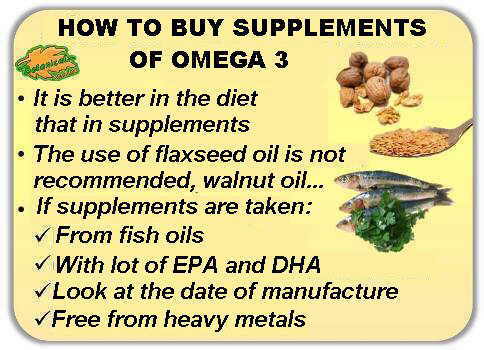
Recommended omega 3 supplement brands. There is much confusion, because it is really best to consume food instead of supplements, which are not as advisable.
Hazards, toxicity and contraindications of omega 3
Omega 3 capsules are nutritional supplements and have no toxicity. That is, these nutrients are naturally found in the diet foods, therefore, their intake in the form of a supplement does not have a specific contraindication, in a similar way to foods that contain omega 3.
However, they can have adverse effects:
![]() More information on omega 3.
More information on omega 3.


